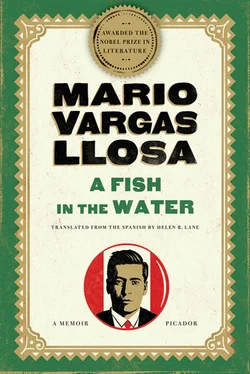Mario Vargas Llosa - A Fish in the Water - A Memoir
Здесь есть возможность читать онлайн «Mario Vargas Llosa - A Fish in the Water - A Memoir» весь текст электронной книги совершенно бесплатно (целиком полную версию без сокращений). В некоторых случаях можно слушать аудио, скачать через торрент в формате fb2 и присутствует краткое содержание. Год выпуска: 2015, Издательство: Macmillan, Жанр: Биографии и Мемуары, на английском языке. Описание произведения, (предисловие) а так же отзывы посетителей доступны на портале библиотеки ЛибКат.
- Название:A Fish in the Water: A Memoir
- Автор:
- Издательство:Macmillan
- Жанр:
- Год:2015
- ISBN:нет данных
- Рейтинг книги:3 / 5. Голосов: 1
-
Избранное:Добавить в избранное
- Отзывы:
-
Ваша оценка:
- 60
- 1
- 2
- 3
- 4
- 5
A Fish in the Water: A Memoir: краткое содержание, описание и аннотация
Предлагаем к чтению аннотацию, описание, краткое содержание или предисловие (зависит от того, что написал сам автор книги «A Fish in the Water: A Memoir»). Если вы не нашли необходимую информацию о книге — напишите в комментариях, мы постараемся отыскать её.
is a twofold book: a memoir of one of Latin America's most celebrated witers, beginning with his birth in 1936 in Arequipa, Peru; and the story of his organization of the reform movement which culminated in his bid for the Peruvian presidency in 1990.
A Fish in the Water: A Memoir — читать онлайн бесплатно полную книгу (весь текст) целиком
Ниже представлен текст книги, разбитый по страницам. Система сохранения места последней прочитанной страницы, позволяет с удобством читать онлайн бесплатно книгу «A Fish in the Water: A Memoir», без необходимости каждый раз заново искать на чём Вы остановились. Поставьте закладку, и сможете в любой момент перейти на страницу, на которой закончили чтение.
Интервал:
Закладка:
Mario Vargas Llosa
A Fish in the Water: A Memoir
This book is dedicated to
Frederick Cooper Llosa
Miguel Cruchaga Belaunde
Luis Miró Quesada Garland
Fernando de Szyszlo
with whom everything began
and to my friends
of the Freedom Movement
Primitive Christians also knew very explicitly that the world is ruled by demons and that anyone who becomes involved in politics, that is to say, anyone who agrees to use power and violence as means, has sealed a pact with the devil, so that it is no longer true that in his activity the good produces only good and the bad bad, but that the contrary frequently happens. Anyone who does not see this is a child, politically speaking.
— MAX WEBER, Politics as a Vocation (1919)One. The Man Who Was My Papa
My mama took me by the arm and led me out into the street by the service entrance of the prefecture. We walked along toward the Eguiguren embankment. It was the final days of 1946 or the first days of 1947, but exams at the Salesian school were already over, I had finished the fifth grade, and summer in Piura, with its white light and asphyxiating heat, had already come.
“You already know it, of course,” my mama said, without her voice trembling. “Isn’t that so?”
“Know what?”
“That your papa isn’t dead. Isn’t that so?”
“Of course. Of course.”
But I didn’t know that, or even remotely suspect it, and it was as if the world had left me paralyzed with surprise. My papa, alive? And where had he been all the time I thought he was dead? It was a long story that up until that day — the most important day in my life till then and, perhaps, in my later life, too — had been carefully hidden from me by my mother, my grandfather and grandmother, my great-aunt Elvira — Mamaé—and my aunts and uncles, that vast family with which I spent my childhood, first in Cochabamba and then, once my grandfather Pedro was appointed mayor of this city, here in Piura. An episode in a cruel and vulgar serial, which — I gradually discovered this later, as I went about reconstructing it with facts from here and there and imaginary additions in places where it turned out to be impossible to fill in the blanks — had made my mother’s family (my only family, in fact) terribly ashamed and ruined my mother’s life when she was still little more than an adolescent.
A story that had begun thirteen years before, more than two thousand kilometers away from this Eguiguren embankment, the scene of the great revelation. My mother was nineteen years old. She had gone to Tacna with my granny Carmen — who came from Tacna — from Arequipa, where the family lived, to attend the wedding of a relative, on March 10, 1934, when, in what must have been a jerry-built, very recently constructed airport in that provincial city, someone introduced her to the man who operated the radio transmitter for Panagra, the company that would later become Pan American Airlines: his name was Ernesto J. Vargas. He was twenty-nine years old and very good-looking. My mother was very taken with him, from that moment on and for the rest of her life. And he must have fallen in love at first sight, too, because when, after a few weeks’ vacation in Tacna, she went back to Arequipa, he wrote her a number of letters and even made a trip there, to say goodbye to her when Panagra transferred him to Ecuador. On that very brief visit of his to Arequipa they became officially engaged. The engagement was carried on by letter; they didn’t see each other again until a year later, when my father — whom Panagra had just transferred once more, this time to Lima — appeared in Arequipa again for the wedding. They were married on June 4, 1935, in the house on the Bulevar Parra where my grandparents lived, beautifully decorated for the occasion. In the photograph that survived (they showed it to me many years later), Dorita can be seen posing in her white dress with a long train and a transparent veil, wearing an expression not at all radiant, but solemn, rather, and in her big dark eyes a somber shadow of curiosity as to what the future would bring her.
What it brought her was disaster. After the wedding, they immediately journeyed to Lima, where my father worked for Panagra. They lived in a little house on the Calle Alfonso Ugarte, in Miraflores. From the very first, he gave evidence of what the Llosa family was to call, euphemistically, Ernesto’s strange-mindedness. Dorita was subjected to a prison routine, forbidden to visit friends of hers, in particular her relatives, and forced to remain permanently at home. Her only outings were made in the company of my father and consisted of going to a movie theater or visiting his older brother, César, and his wife Orieli, who also lived in Miraflores. Jealous scenes followed one upon the other on the slightest pretext, and sometimes without any pretext at all, and they could lead to violence.
Many years later, when I already had gray hair and it was possible for me to talk with her about the five and a half months that her marriage lasted, my mother was still putting forward the family’s explanation for its failure: Ernesto’s bad disposition and his fiendish fits of jealousy. And casting part of the blame on herself, too, perhaps, since she had been such a pampered young girl, for whom life in Arequipa had been so easy, so comfortable, had not prepared her for that difficult test: having to leave overnight to go live in another city with such a dominating person, so different from all those around her.
But the real reason for the failure of their marriage was not my father’s jealousy or his bad disposition, but the national disease that gets called by other names, the one that infests every stratum and every family in the country and leaves them all with a bad aftertaste of hatred, poisoning the lives of Peruvians in the form of resentment and social complexes. Because Ernesto J. Vargas, despite his white skin, his light blue eyes and his handsome appearance, belonged — or always felt that he belonged, which amounts to the same thing — to a family socially inferior to his wife’s. The adventures, misadventures, and deviltry of my paternal grandfather, Marcelino, had gradually impoverished and brought the Vargas family down in the world till they reached that ambiguous margin where those who are middle-class begin to be taken for what those of a higher status call “the people,” and in a position where Peruvians who believe that they are blancos (whites) begin to feel that they are cholos , that is to say mestizos, half-breeds of mixed Spanish and Indian blood, that is to say poor and despised. In particolored Peruvian society, and perhaps in all societies which have many races and extreme inequalities, blanco and cholo are terms that refer to other things besides race or ethnic group: they situate a person socially and economically, and many times these factors are the ones that determine his or her classification. This latter is flexible and can change, depending on circumstances and the vicissitudes of individual destinies. One is always blanco or cholo in relation to someone else, because one is always better or worse situated than others, or one is more or less poor or important, or possessed of more or less Occidental or mestizo or Indian or African or Asiatic features than others, and all this crude nomenclature that decides a good part of any one person’s fate is maintained by virtue of an effervescent structure of prejudices and sentiments — disdain, scorn, envy, bitterness, admiration, emulation — which, many times, beneath ideologies, values, and contempt for values, is the deep-seated explanation for the conflicts and frustrations of Peruvian life. It is a grave error, when discussing racial and social prejudices in Peru, to believe that they act only from the top down; parallel to the contempt that the white shows toward the mestizo, the Indian, and the black, there exists the bitterness of the mestizo against the white and the Indian and the black, and of each one of these latter three against all the others, feelings — or perhaps it would be more accurate to speak of impulses or passions — that lie concealed behind political, professional, cultural, and personal rivalries, in accordance with a process which cannot even be called hypocritical, since it is rarely rational and seldom openly revealed. In the majority of cases it is unconscious, stemming from an ego that is hidden and blind to reason; it is taken in with one’s mother’s milk and begins to be shaped from the time of the Peruvian’s first birth-cry and babblings as a baby.
Читать дальшеИнтервал:
Закладка:
Похожие книги на «A Fish in the Water: A Memoir»
Представляем Вашему вниманию похожие книги на «A Fish in the Water: A Memoir» списком для выбора. Мы отобрали схожую по названию и смыслу литературу в надежде предоставить читателям больше вариантов отыскать новые, интересные, ещё непрочитанные произведения.
Обсуждение, отзывы о книге «A Fish in the Water: A Memoir» и просто собственные мнения читателей. Оставьте ваши комментарии, напишите, что Вы думаете о произведении, его смысле или главных героях. Укажите что конкретно понравилось, а что нет, и почему Вы так считаете.












